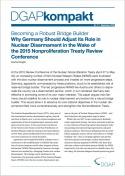The Nuclear Nonproliferation Treaty (NPT), a key part of the international nuclear disarmament regime, entered into force in March 1970. A review of past compliance and negotiations of future implementation measures takes place every five years. At the 2015 Review Conference of the Parties to the Treaty on the Non-Proliferation of Nuclear Weapons, held this spring at the United Nations in New York, parties deliberated for four weeks but did not reach consensus on a final document.
Agreement was formally blocked by a dispute over a conference on the establishment of a Middle East zone free of nuclear weapons and all other weapons of mass destruction (WMD). More generally, however, the negotiations were marked by a changing climate over nuclear disarmament. This change can be attributed to the frustrations of a growing number of Non-Nuclear-Weapon States (NNWS) over the slow nuclear disarmament process on the part of Nuclear-Weapon States (NWS) – and their insistence that progressive steps be taken.
Within the 2015 NPT review conference’s decidedly cooler negotiation climate, Germany continued to pursue its core interests of fostering nuclear disarmament while maintaining international legal agreements and good political relations. The German delegation held its established, pragmatic course, which it describes as a “bridge-building” role – that is, bringing together state parties that favor quicker and stronger nuclear disarmament measures (namely progressive NNWS) with those that advocate a slower and weaker process (chiefly the NWS). Importantly, this role was reserved in a double sense. For one thing, the German delegates favored preserving good relations with Germany’s allied NWS – particularly the United States – over stronger disarmament measures, which made them biased. For another, Germany mainly proposed soft disarmament actions that hardly went beyond the minimum, often vague consensus of the international community. Due to the reserved nature of policies pursued by the delegation from Berlin, the progressive NNWS depreciated it as disarmament partner at the conference – a situation that is likely to persist after the NPT review conference. As a consequence, Germany was less effective in pursuing some of its major national objectives: advancing the process toward nuclear abolition and preserving the legal Nonproliferation Treaty. This paper argues that Germany can more comprehensively promote its core interests in field – and strengthen the NPT – if it redefines its role and evolves into a more robust bridge builder, even as it retains its pragmatic approach.
READ MORE HERE

